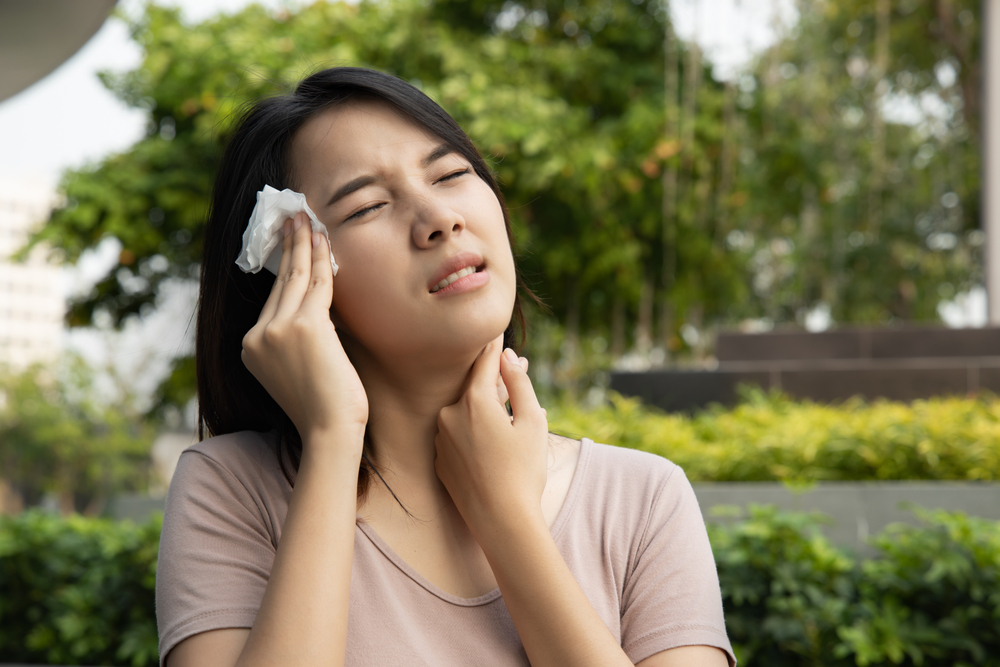
Too much moisture in the air can make you feel sticky and uneasy, and it may also be a factor in sinus problems. Many individuals experience worsened sinus issues during humid weather, with conditions like sinus infections becoming more common. Sinusitis, also known as sinus infections, develops when the sinuses become inflamed because of an infection or irritation, and increased humidity can worsen this situation. This article will explore the effects of moisture on sinus health, symptoms to watch for, and ways to protect your sinuses from the unpleasant repercussions of high moisture levels in the atmosphere.
Understanding sinus infections: Symptoms you shouldn’t ignore
Sinusitis, also called sinus infections, is a normal occurrence that can cause disturbances in daily activities, especially in humid weather. These infections develop when the sinuses, which are cavities in your skull, become blocked and inflamed as a result of the buildup of mucus. Various factors, including infections, microbial contaminants, or outside stimuli, can cause this to occur.
Identifying a sinus infection early can reduce the dangers of additional health problems. Recognize these warning signs:
- Nasal Congestion: If you have a plugged nose that won’t clear up, especially for more than 10 days, it may be a sinus infection.
- Pressure Headaches: A dull headache or pressure in your forehead, eyes, or cheeks might indicate inflammation in your sinuses.
- Tooth Pain: When sinuses become inflamed, the pressure can sometimes produce pain in the upper teeth.
- Persistent Sinus Congestion: A continuous stream of mucus down the back of the throat or thick, sticky discharge is a common sign of a sinus infection.
- Fever: If you’re dealing with a low-grade fever alongside other symptoms, it could indicate an infection.
If your symptoms linger for more than a few days or are acute, it’s best to consult with a healthcare provider to get a proper diagnosis and treatment strategy.
The connection between sinus infections and humidity levels.
The presence of humidity in the air can have an unforeseen impact on how sinus infections form and how severe they become. High amounts of moisture in the air do not directly result in sinusitis, but they can worsen the problem by fostering conditions that support infection and inflammation. Here’s how:
- Cilia Dysfunction: The cilia in your nasal canal are in charge of trapping and expelling pathogens, dust, and mucus. However, when exposed to excive moisture, these little hair-like structures can become less effective at moving mucus out of your sinuses, leading to a higher risk of infection.
- Higher moisture levels can lead to a surge in allergy-causing compounds, including mold and dust mites, which flourish rapidly in moist conditions. Exposure to these allergens can trigger sinus irritation, leading to inflamation and congestion, which in turn raises the risk of experiencing a sinus infection.
What level of humidity is most advantageous for preserving healthy sinuses?
Maintaining the correct level of moisture in the air is essential for keeping your sinuses healthy. While your body’s normal defenses– like mucus and cilia– require some moisture to function properly, too much humidity can cause issues.
Monitoring outdoor humidity and dew points can help you determine when to take action. When moisture levels are high, it’s a good idea to reduce your exposure or incorporate measures to regulate the inside moisture levels in your house.
How to safeguard your sinuses from humidity-induced infections
To protect your sinuses against the detrimental effect of humid surroundings, consider implementing a few preventive strategies. Here’s what you can do to decrease the danger of sinus infections:
- Control Allergen Exposure: During high-humidity days, try to remain indoors as much as possible to avoid allergens such as pollen and mold, which thrive in moist settings. If you do venture outside, attempt to stay away from wooded areas or spots with substantial mold growth.
- Employ Nasal Sprays: A saline nasal spray can help keep your nasal canals moist without encouraging infection. This improves the cilia’s effectiveness in removing mucus and infectious agents.
- Control Indoor Humidity: Use a dehumidifier indoors, especially during humid months, to help maintain a comfortable and healthy air quality. Keep humidity levels in check to avoid generating an ideal breeding ground for bacteria and mold.
When is it time to Speak with an Ear, Nose, and Throat Doctor
If you find yourself coping with frequent or severe sinus infections during humid weather, it may be time to consult with an Ear, Nose, and Throat (ENT) specialist. An ENT can assess whether your sinus anatomy or other hidden conditions are contributing to your symptoms and provide treatment options to help you breathe easier. They may prescribe medications and allergy therapies to minimize swelling and prevent future infections.
Enjoy a summer free from sinus irritation
Summer doesn’t need to be synonymous with sinus trouble. Comprehending the effect of humidity on your sinus health and applying tactics to manage it can help you have a more comfortable season without sinus infections. Whether through preventive measures at home, lifestyle adjustments, or professional care, you can reduce the danger of infection and maintain sinus health year-round.
If you’re experiencing persistent sinus symptoms or want expert advice on managing humid conditions, it’s important to seek guidance from a trusted ENT specialist. They offer personalized treatment solutions designed to suit your individual requirements, assisting in maintaining the health of your sinuses and ensuring an enjoyable summer.
Call us to make an appointment today.